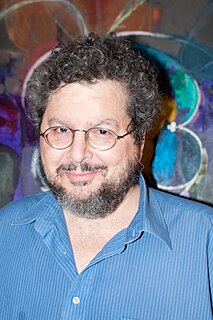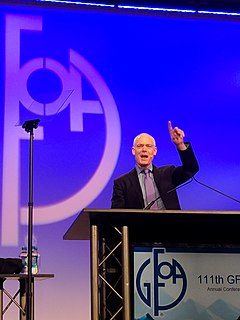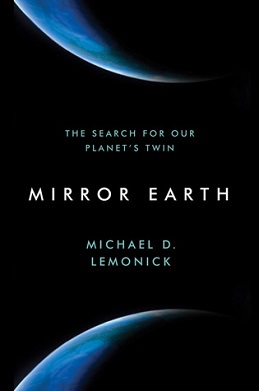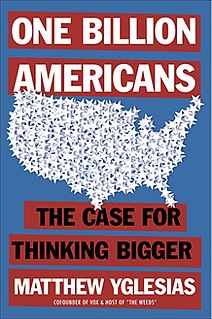
Darwinism is a theory of biological evolution developed by the English naturalist Charles Darwin (1809–1882) and others, stating that all species of organisms arise and develop through the natural selection of small, inherited variations that increase the individual's ability to compete, survive, and reproduce. Also called Darwinian theory, it originally included the broad concepts of transmutation of species or of evolution which gained general scientific acceptance after Darwin published On the Origin of Species in 1859, including concepts which predated Darwin's theories. English biologist Thomas Henry Huxley coined the term Darwinism in April 1860.

David Hillel Gelernter is an American computer scientist, artist, and writer. He is a professor of computer science at Yale University.
In philosophy, moral responsibility is the status of morally deserving praise, blame, reward, or punishment for an act or omission in accordance with one's moral obligations. Deciding what counts as "morally obligatory" is a principal concern of ethics.

James C. "Jim" Collins is an American researcher, author, speaker and consultant focused on the subject of business management and company sustainability and growth.

David Eagleman is an American neuroscientist, author, and science communicator. He teaches neuroscience at Stanford University and is CEO and co-founder of Neosensory, a company that develops devices for sensory substitution. He also directs the non-profit Center for Science and Law, which seeks to align the legal system with modern neuroscience and is Chief Science Officer and co-founder of BrainCheck, a digital cognitive health platform used in medical practices and health systems. He is known for his work on brain plasticity, time perception, synesthesia, and neurolaw.

Neurolaw is a field of interdisciplinary study that explores the effects of discoveries in neuroscience on legal rules and standards. Drawing from neuroscience, philosophy, social psychology, cognitive neuroscience, and criminology, neurolaw practitioners seek to address not only the descriptive and predictive issues of how neuroscience is and will be used in the legal system, but also the normative issues of how neuroscience should and should not be used.
Jennet Conant is an American non-fiction author and journalist. She has written five books about World War II, three of which have appeared on the New York Times Best Seller list: Tuxedo Park: A Wall Street Tycoon and the Secret Palace of Science that Changed the Course of WWII, 109 East Palace: Robert Oppenheimer and the Secret City of Los Alamos, The Irregulars: Roald Dahl and the British Spy Ring in Wartime Washington, and A Covert Affair: Julia Child and Paul Child in the OSS.
Possibilianism is a philosophy that rejects both the diverse claims of traditional theism and the positions of certainty in strong atheism in favor of a middle, exploratory ground. The term was invented by Robbie Parrish, a friend of neuroscientist David Eagleman who defined the term in relation to his 2009 book, Sum: Forty Tales from the Afterlives.

Andrew Yan-Tak Ng is a British-born American computer scientist and technology entrepreneur focusing on machine learning and AI. Ng was a co-founder and head of Google Brain and was the former chief scientist at Baidu, building the company's Artificial Intelligence Group into a team of several thousand people.

The Social Animal: The Hidden Sources of Love, Character, and Achievement is a non-fiction book by American journalist David Brooks, who is otherwise best known for his career with The New York Times. The book discusses what drives individual behavior and decision making. Brooks goes through various academic topics such as sociology, psychology, and biology and attempts to summarize various discoveries— such as brain development in early life. The book continually refers to two fictional characters 'Harold' and 'Erica', used by Brooks as examples of how people's emotional personality changes over time.

Incognito: The Secret Lives of the Brain is a 2011 New York Times best-selling nonfiction book by American neuroscientist David Eagleman, an adjunct professor at Stanford University. The book explores the juxtaposition of the conscious mind and the unconscious mind, with Eagleman summing up the text's themes with the question: "If the conscious mind—the part you consider to be you—is just the tip of the iceberg, what is the rest doing?"
Safi R. Bahcall is an American physicist, technologist, business executive, and author.

Mirror Earth: The Search for Our Planet's Twin is a 2012 non-fiction book by Michael D. Lemonick. It discusses the work of "exoplaneteers"—defining the term as a group of scientists looking through various other planetary systems to detect alternate planets that are suitable for possible life.
The Brain with David Eagleman is a PBS documentary series created and presented by neuroscientist Dr. David Eagleman. Eagleman explores the wonders of the human brain with the goal of revealing why we feel and think the things we do. The series debuted on PBS in 2015, followed by airings on the BBC in the United Kingdom and the SBS in Australia. As of early 2016 it has been nominated for an Emmy Award.

A Gentle Madness: Bibliophiles, Bibliomanes, and the Eternal Passion for Books is a 1995 nonfiction book of book collecting case studies by Nicholas A. Basbanes. It was a 1995 National Book Critics Circle Award finalist.

Micah Zenko is an American political scientist. He is Whitehead Senior Fellow on the US and Americas Programme at Chatham House. He is author of two books.

Life 3.0: Being Human in the Age of Artificial Intelligence is a 2017 book by Swedish-American cosmologist Max Tegmark . Life 3.0 discusses Artificial Intelligence (AI) and its impact on the future of life on Earth and beyond. The book discusses a variety of societal implications, what can be done to maximize the chances of a positive outcome, and potential futures for humanity, technology and combinations thereof.
Jean C. Oi is an American political scientist and expert in the politics of China. She is the William Haas Professor in Chinese Politics in the department of political science at Stanford University. She is also a senior fellow at the Freeman Spogli Institute for International Studies there. She studies political economy and fiscal reform, particularly in rural China.

One Billion Americans: The Case for Thinking Bigger is a book by Matthew Yglesias, first published in 2020. One Billion Americans argues that America is not over-crowded and could have one billion citizens, and still have less than half the population density that Germany has today. Additionally, it makes the case that America is justified for wanting to stay relevant into the far distant future, and that in order to do so, it will need to be populated like China and India. In order to support growth, Yglesias argues for a variety of programs, including increased government spending on child care and day care, the use of S-trains for urban transportation, and increased immigration to the United States, under the general rubric of increasing the American population. It suggests that a substantial increase to the population of the United States is necessary to perpetuate American hegemony. The book gives special attention to housing policy, critiquing zoning requirements that limit urban density in American cities.

Breath: The New Science of a Lost Art is a 2020 popular science book by journalist James Nestor. The book provides a historical, scientific and personal examination of breathing, with a specific interest in contrasting the differences between mouth breathing and nasal breathing.














